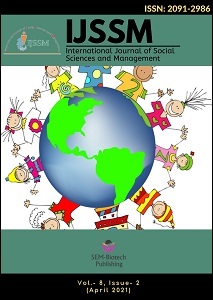Perceptional Effects of Reservation Policy for The Inclusive Civil Service of Nepal
DOI:
https://doi.org/10.3126/ijssm.v8i2.34676Keywords:
social inclusion, policy implementation, reservation policy, perceptional effects, civil service of NepalAbstract
This research article aims to carry out the perceptional effects of reservation policy for the inclusive civil service of Nepal with the theoretical foundation of equitable and a just society. This article adopted mixed method approach. Similarly, in order to show the linkage between primary and secondary data, content analysis was conducted from the observational notes, field notes, and responses collected by closed ended questionnaire for 130 respondents in questionnaire survey and interviews. The bivariate analysis between dependent variable and independent variable shows the effects of gender, age and education matters in inclusiveness of civil service i.e. there is high relationship between these variables. Organizational effects of reservation system have been highly significant relationship between the representativeness and participation in civil service of Nepal. This newly introduced system has been able to give some positive impacts in terms of increasing representation of some marginalized communities but has created some controversies and confusions as well. Whereas Nepalese reservation system has not still given comprehensive attention to all the dimensions of exclusion but its effects on generating attraction of some targeted marginalized people towards national bureaucratic system is literally praiseworthy
Int. J. Soc. Sc. Manage. Vol. 8, Issue-2: 380-390
Downloads
Downloads
Published
How to Cite
Issue
Section
License
This license enables reusers to distribute, remix, adapt, and build upon the material in any medium or format for noncommercial purposes only, and only so long as attribution is given to the creator.




